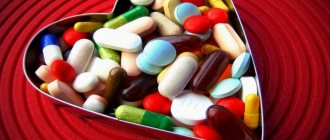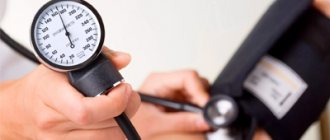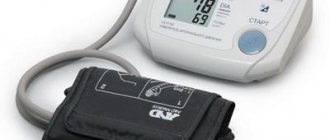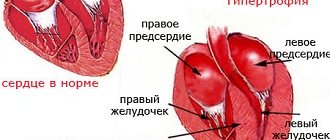Home>Articles>Features of the effects of alcohol on blood pressure
quick menu (hide)
- The effect of alcohol on blood pressure
- Alcoholic drinks for hypertension
- Alcohol for hypotension
- Actions in case of high blood pressure
- High blood pressure due to hangover and binge drinking
- The effect of different types of alcohol on blood pressure
Men and women suffering from hypertension or hypotension are often interested in the question: how does alcohol affect blood pressure and can it be consumed if these diseases are present? Experts believe that alcoholic drinks can both lower and increase blood pressure levels.
The effect of alcohol in hypertension or hypotension depends on many factors - what kind of drinks were consumed, how often and in what quantity. Regular drinking of alcohol in large quantities necessarily leads to an increase in blood pressure, and after a while – to a decrease. Therefore, hypertensive and hypotensive patients should be extremely careful with strong drinks.
The effect of alcohol on blood pressure
When answering the question of whether alcohol affects blood pressure, it should be remembered that ethyl alcohol significantly increases the likelihood of developing hypertension. This indicator directly depends on the amount drunk. Frequent consumption of alcohol can have serious consequences for the cardiovascular system and the entire body. Therefore, it is very important not to get carried away with strong drinks and drink them in moderation.
Regardless of blood pressure, alcohol is absolutely contraindicated in the following cases:
- period of pregnancy and breastfeeding;
- children and adolescents up to 18 years of age;
- renal and liver pathologies;
- mental disorders;
- brain diseases.
Does alcohol raise or lower blood pressure? It all depends on the amount you drink. Depending on the individual characteristics of the body, each person has his own alcohol limit, which is safe and harmless to the health of the heart and blood vessels. Most often it is 500 ml of beer, 150-200 ml of wine, 50-80 ml of vodka, cognac or other strong drink.
The main danger of these indicators is that with regular use, a person develops a strong attachment to strong drinks, as well as a desire to constantly increase the dosage of the drink. In many cases, this becomes the cause of alcoholism.
How to protect your liver?
Do you like wine, systematically exceed the safe dose, and are you worried about weakness, nausea, have you lost your appetite, have you lost weight, have the color of your stool and urine changed? Has your skin turned yellow?
Even if only one such sign appears, consult a doctor immediately.
If you relax with wine infrequently and keep yourself within limits, we still recommend getting examined from time to time, even if nothing bothers you. You don’t have to be an antisocial element or an alcoholic to develop cirrhosis. The liver does not hurt until the very last stages. And both successful and prosperous people get sick.
Here is a list of studies to find out about the condition of the liver and help it in time:
- Examination and examination by a hepatologist-gastroenterologist
- Tests : general blood and urine analysis, biochemistry: ALT, AST, GGT, alkaline phosphatase, bilirubin, protein fractions, lipid profile, glycosylated hemoglobin.
- Research : Ultrasound of the abdominal organs and elastography of the liver.
If there are deviations in the data from this examination, it is worth doing a more detailed one.
Who to trust?
- For those who do their work conscientiously, we care what happens to you. The initial appointment with our specialist lasts about an hour. This means that we pay attention to the most insignificant, at first glance, details. Often this approach helped to make a diagnosis on time and save the patient’s life. If all is well, you will receive recommendations for prevention. Our doctors do not burden you with unnecessary treatment. If, according to the examination data, you need to treat the digestive system or consult related specialists, your attending physician will monitor and coordinate everything.
- Those who have expert knowledge and high qualifications. Our center employs unique federal-level specialists - professors, doctors of science, candidates of science and doctors of the highest category. For some diseases, they are the only experts in Russia. And, of course, we are attentive to each patient, regardless of his status, and are ready to explain in clear, non-medical language how things are with his health and what the prognosis is.
- Those who accurately diagnose and effectively treat. In our center, you can learn everything about the condition of your liver and the risks of drinking wine in just 1 day—that’s exactly how long it takes for the examination. If the results reveal deviations, it is worth doing a more detailed examination.
Experts at the EXPERT Clinic are ready to give you as much information as possible about your condition. And also a forecast of how your liver will feel in the future, and recommend competent treatment to protect it.
Alcohol for hypertension
Experts believe that alcohol can be consumed if you have hypertension - but only within limits that do not cause a hangover . In such cases, it has virtually no effect on blood pressure levels. But as a hangover develops, the blood pressure level quickly rises , and the hypertensive patient’s well-being worsens even more.
In some cases, the cause of hypertension is excess body weight . As you know, alcoholic drinks are very high in calories and can provoke excess weight - as a result, the disease only gets worse.
The main side effects of alcohol in hypertension:
- Reduced effectiveness of medications taken.
- Increase in body weight, development of obesity.
- Increased blood sugar and cholesterol levels.
- Formation of blood clots, thickening of blood.
- Disturbances in the functioning of the central nervous and cardiovascular systems.
- Swelling of the face and body.
- Deterioration of elasticity and tone of blood vessels.
- Increased intracranial pressure.
If a hypertensive patient is taking any medications for high blood pressure, ethyl alcohol can neutralize their therapeutic effect and minimize the effectiveness of treatment.
In addition, alcohol increases the manifestations of side effects of medications for hypertension, therefore, when answering the question of whether alcohol can be used for hypertension, it is important to remember that such compatibility carries a mortal danger to the human body. At least 12 hours must pass between taking the medication and drinking alcohol.
Contraindications for drinking wine
In addition to healing properties, wine can also create negative effects on the body. In some cases, treatment with wine drinks is strictly unacceptable:
- For hypertension progressing against the background of bronchial asthma.
- Allergic reaction to components present in wines.
- Alcohol addiction.
- For migraines and diseases of the gastrointestinal tract: gastritis, ulcers, pancreatitis.
- Manifestations of mental and nervous disorders.
These diseases can also occur in a latent form. This is the second reason why you should consult a specialist before drinking wine. After conducting an examination of the whole body, he will assess the patient's health status, and then adjust the wine dosage or prohibit the use of wine to treat hypertension.
What to do if your blood pressure rises?
If a person drank a strong drink and then felt unwell, it is necessary to measure the blood pressure level. An increased rate, not exceeding 20-25% of the norm, can be eliminated by taking magnesium sulfate - an affordable and safe drug, which is also known as magnesia.
High blood pressure exceeding 25% of normal is an alarming sign that requires immediate medical attention. You need to call an ambulance immediately.
Instead of a resume
In Russia, per citizen, including old people and babies, there are 18 liters (!) of pure alcohol per year. This is one of the highest rates in the world. Alcohol kills more than a hundred Russian citizens every day. There are 150 bottles of vodka per year per man in the Russian Federation. These are the statistics.
Your choice is whether to drink alcohol in general, and wine in particular. You decide what kind of wine to drink and how much. Our task is to provide an opportunity to be examined at an expert level in a timely manner and to undergo treatment, if necessary, in order to maintain health.
High blood pressure due to hangover and binge drinking
Hangover syndrome is characterized by various autonomic disorders - severe headaches and dizziness, tremors of the limbs, increased heart rate, difficulty breathing, decreased or increased blood pressure. In such cases, hypertensive patients are recommended to take magnesium sulfate, as well as drugs for general detoxification after a feast.
In case of binge drinking, the blood pressure level increases and lasts for a long time. To eliminate the problem, you can use the following medications :
- Capozide.
- Adelfan.
- Kapoten.
- Furosemide.
- Diacarb.
- Triampur.
- Glycerol.
Diuretics, which include Furosemide and Diacarb, must be taken with great caution. Together with excess fluid, Furosemide removes useful microelements from the body - therefore, the pharmacological drug should not be taken for hypotension and arrhythmia.
Diacarb is considered a diuretic drug with a milder and more gentle effect. In most cases, it is well tolerated by the human body, does not affect metabolic processes and electrolyte balance, and has a minimal number of contraindications and side effects. After binge drinking, Diacarb is recommended to take a tablet every morning for 5-7 days.
The effect of different types of alcohol on blood pressure
There is an opinion that only strong alcoholic drinks can affect blood pressure. This is wrong. Beer and other low-alcohol drinks have a small percentage of ethyl alcohol, so a person, without noticing it, drinks a large amount of the drink. This puts increased stress on the kidneys and increases the risk of a hypertensive attack .
There are a number of alcoholic drinks that cause a decrease in blood pressure:
- cognac;
- whiskey;
- balm;
- White wine.
Most often, these alcoholic drinks lower blood pressure for a short period of time - no more than 2-3 hours, after which it can rise even more.
Also, as a result of the research, strong drinks were identified that can increase blood pressure. These include:
- vodka;
- red wine;
- champagne;
- beer.
But the effect of ethyl alcohol depends on the individual characteristics of the body, so in no case should you use alcohol as a means to lower or increase blood pressure. Adverse reactions of this combination can be the most severe. Doctors recommend drinking alcohol no more than 1-2 times a week - it is safe for health.
Dry red wine
The question of the effect of wine on blood pressure has always interested doctors and patients. Many scientists are of the opinion that regular consumption of small doses of dry red wine (50–100 ml per day) is beneficial for health. But the drink must be natural, without coloring additives or preservatives.
A weak (9 to 11.5%) ruby-colored wine with a pleasant tart taste and delicate aroma is produced from red and black grapes. The whole berries are used: with the peel and seeds, which release many useful substances into the juice.
In addition to vitamins B and A, C, E, PP, red wine contains important microelements for the body: iodine, magnesium, phosphorus, potassium and iron. The drink contains complex organic antioxidant substances that have the properties of binding free radicals, positively influencing the state of the cardiovascular system and helping to normalize blood pressure.
Polyphenols (flavonoids) found in red wine:
- Resveratrol (polyalexin of plant origin). This substance improves the condition of the endothelium, the inner layer lining blood vessels, and stimulates the production of nitric oxide (NO), which is necessary for increased blood circulation. Resveratrol slows down the formation of cholesterol deposits on the walls of blood vessels and prevents their narrowing, which helps normalize blood pressure.
- Tannins are tannins that strengthen the walls of blood vessels and increase their elasticity, protecting against pathologies that occur with atherosclerosis.
- Procyanides (anthocyanins) – glycosides that are found in red and black grape varieties – are very beneficial for blood vessels, giving the red color to wine. They also reduce the risk of heart disease.
Vintage red dry wine lowers blood pressure. The effect is much longer lasting than with other types of alcohol, when blood pressure rises again after half an hour. According to doctors, fruit acids contained in natural red wine relieve vascular spasms after the effect of alcohol wears off.
Judging by the results of medical studies, a decrease in blood pressure after taking a drink occurs only in cases where it was initially elevated.
The well-known “French paradox” testifies in favor of the use of dry vintage wines in small doses for the treatment and prevention of many diseases. The French are loyal fans of red wines: not a single meal is complete without a glass of this drink. But the statistics of cardiovascular diseases and pathologies of the digestive system are the lowest in the world. But French cuisine cannot be called dietary. Most likely, the healing properties of wine help gourmets stay healthy while eating cholesterol-rich foods.
Drinking grape juice from the same grape varieties does not produce a therapeutic result, nor does taking dietary supplements containing polyphenols or glycosides. All these bioactive substances act only in wine.
But you need to remember that the “medical” dose of dry red wine is 50–100 ml per day, which is equal to 2–3 glasses per week, at dinner. Exceeding the norm can have the opposite effect and provoke an exacerbation of chronic diseases or the emergence of new diseases.
For those who do not like alcohol, it is recommended to dilute the wine with table mineral water in a 1:2 ratio. At the same time, all useful substances are retained in the drink.
Dry red wines reduce blood pressure, table and fortified wines increase










